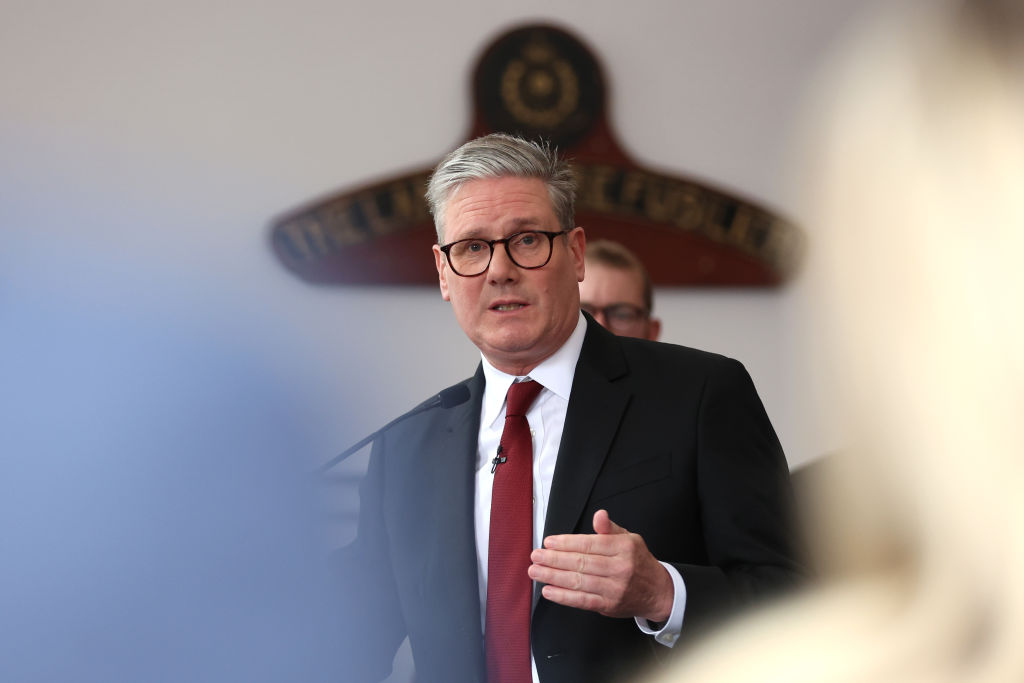Still haunted by the memory of Jeremy Corbyn’s leadership, Keir Starmer has devoted today to reassuring the electorate that he is committed to maintaining nuclear weapons. The Labour leader is determined not to be seen as unreliable on defence and national security, so has announced that HIS government will introduce a ‘triple lock’ on the nuclear deterrent.
A ‘triple lock’ is a tedious phrase, beloved by politicians who have been so careless with promises that they have to engage in a linguistic arms race. If they say they will do something, voters simply don’t believe them, so instead they must create the impression of an inviolable pledge, a measure that will be permanent and irreversible – something that is, happily, impossible in our system of government. The coalition created a ‘triple lock’ on the state pension in 2010, under which the payment would increase by whichever of three measures was highest: average earnings, inflation or 2.5 per cent.
Labour’s commitment to Britain’s nuclear deterrent is neither surprising nor newsworthy
Starmer’s nuclear deterrent ‘triple lock’ is, however, a peculiar beast. It is nothing more than a statement that the current government’s policy on nuclear weapons will be unaltered. The three components of the lock are: building four Dreadnought-class nuclear-powered ballistic missile submarines; maintaining continuous at-sea deterrence (CASD); and delivering any and all future upgrades required to keep the new submarines operational.
This is hardly groundbreaking. Three of the four submarines – Dreadnought, Valiant and Warspite – are already under construction by BAE Systems at Barrow-in-Furness, with only the fourth, HMS King George VI, yet to be given any physical form. But no one had seriously suggested that any of the boats might be cancelled, and, in any event, a commitment to building four submarines and a commitment to CASD are inseparable. You cannot maintain a constant availability with fewer than four vessels. As for necessary upgrades, it would be a strange policy to spend tens of billions of pounds on the nuclear deterrent and then fail to maintain it. So there is nothing to see here.
This announcement is also jarring because the overriding theme of Labour’s election campaign is change. The word looms from every backdrop before which Starmer and his shadow ministers appear. It is logically true that a wholehearted commitment to the nuclear deterrent does represent a change for Labour from the days of Corbyn’s stewardship; then again, the 2019 manifesto said clearly that ‘Labour supports the renewal of the Trident nuclear deterrent’.
However, there is a danger that Labour’s eagerness to show its commitment to security means that the introduction of the Dreadnought-class boats and the Trident replacement go relatively unscrutinised. The deterrent already has dangerously little oversight, particularly in financial terms, and this risks putting it further beyond question.
The ‘triple lock’ also betrays a deeper anxiety, one that still permeates the Labour campaign. Despite historic leads in the opinion polls, the most dramatic of which suggest the Conservative party might be all but wiped out, Starmer and his team will not, and cannot, allow themselves to think that the election is a foregone conclusion.
Labour’s commitment to Britain’s nuclear deterrent is neither surprising nor newsworthy. It does, however, provide an insight into Sir Keir Starmer’s assessment of the weakness of his party and its offering. Just as Tony Blair’s mantra of ‘tough on crime, tough on the causes of crime’ reflected an historic perception of Labour as soft on law and order, so this ‘triple lock’ shows us what Labour is worried about. Despite the data from the opinion polls, Starmer still feels vulnerable on defence and national security. That is something on which Conservative strategists, if there are any, might reflect.








Comments